A return to the world of hand built ukuleles once again this week, and back over the water to Nicaragua. This is the NFC Spruce and Cocobolo Concert Cutaway ukulele.
NFC have featured twice before on Got A Ukulele and are the brand of Nicaraguan luthier Néstor Fuentes Castillo. The models in the previous reviews were certainly quirky and standout different but each did well on the scores. They were a baritone and a tenor, but this time a concert instrument arrived and yet another that gave me a sharp intake of breath when I opened the case.
This one is a standard double bout concert with an attractive sloping shoulder cutaway on the upper bout. The top is made from all solid English Spruce and the back and sides solid and local Nicaraguan Cocobolo. Ordinarily I think spruce would look odd against the darker redddish cocobolo, but here Nestor has applied a sunburst to the top which I think pairs it wonderfully. Not only does the action of applying a sunburst (a dark stain on top of the spruce which is then buffed out in the central portion) mean the edges are dark to blend into the cocobolo, but the heart of the top is turned a deep orange which is also attractive. The back cocobolo is highly figured and interesting and without the paler sap wood that this material sometimes displays. I think it looks better for it. I think the whole body looks gorgeous.
The bridge is a tie bar made of cocobolo and is no overly chunky. Being a handmade uke there are small tooling marks in the top wood, but more on luthier tooling later. Sitting in that is a bone saddle with a slight curve to the top (more on that later too). String spacing here is 44mm.
Decor consists of cocobolo binding to the top and back with a paler wood purfling strip to each and either side of the tail strip and a soundhole rosette made of leopardwood. Being hand made some of the edges of some of these details look, well for want of a better descriptor, done by hand! That means they sometimes have minor flaws, though this does not concern me. This IS handmade, done by eye and not a robot in a factory. The body is then finished in a poly gloss which despite some people's claims on my early release pictures is NOT overly thick and mirror smooth. The gloss really helps make the colours in the cocobolo and sunburst pop and shine. The only other thing to mention about the body is the side sound on the upper bout. Nice.
Inside is very tidy with notched hand cut kerfing and very nicely shaped bracing. The top is braced vertically from soundhole to tail. It's also interesting to see that he has coated the inside in a layer or two of oil / finish to remove the 'bare wood' look. That's the preserve of some very high end guitar makers and nice to see here considering the access the sound port give you.
The neck wood is not specified and jointed in the heel, headstock and down the length. The heel joint is very obvious to me and the heel is capped with more cocobolo. The headstock joint is hidden by the facings. Down the middle is a strip of cocobolo as a skunk stripe. Again the finishing of that is a little 'hand done', but I find a certain charm in that. The neck tapers to a fairly flat but rounded profile and a roomy 37mm width (30mm G to A). Comfortable.
Topping the neck is a cocobolo fretboard with more of NFC's edge purfling which looks just great. Like the other models I looked at this has a radius, but feels less severe than the 10 inch I saw on the NFC tenor and feels nicer for it. It is fitted with 17 frets, joined at the 13th and all are dressed smoothly. They are also hidden by the edge binding. Pearl position dots face out at the 3rd, 5th, 7th,10th and 12th and they are repeated with dots on the side. This is the first NFC i've seen with side dots so I think he is clearly receptive to change!
Beyond the bone nut is the usual square-ish NFC headstock. I've said in the past that they looked a little bare, so he has now added a logo! That's the country outline with the letters NFC in the middle. I like the addition, but think cream colouring would be a little less severe. Both the front AND back of the headstock are faced on cocobolo, a technique I do like to see.
The tuners are high quality open gears by Grover with small chrome buttons. Absolutely no complaints here.
Finishing things off are a set of Aquila strings, a 'arts and craftsy' hard case made locally to Nestor and that is available with worldwide shipping included for $800. With worldwide prices going up and up that price doesn't surprise me, but it is more than the last tenor scale I looked at from the brand. Still - I can see where every cent has gone in that price and I didn't choke reading it - there are a lot of man hours in this example. They are available direct via the NFC Facebook page, though he is shortly to be launching a dedicated website. On occasion you also see these in stores like The Uke Room so Matt Stead should be able to hook you up with one too.
So things are all very good here so far, but time to play it. It feels nice in the hands, the radius board is comfortable and it all feels well put together. It's not heavy at 635g and balances well. Setup is excellent and low too.
The volume here is good though not stellar (you will be heard though!) and the sustain is impressive and barrels back into the chest when played. Lively indeed. In fact I had this sat on its case on my dining table earlier and was talking to my wife - my voice was getting picked up by the side port and echoing the instrument!
The tone when strummed is clearly a bright one and quite snappy, perhaps on account of the gloss finish. With a spruce top I expected brightness, but of course that can often take over which is why they tend to be paired with contrasting back and side woods. So the cocobolo is doing its job here as beneath those toppy highs is a richer set of mids that really give some character to the tone. It's certainly not a bassy instrument, but of course is also a concert so I think it would be weird if it was. It's very pleasant though I felt it needed quite a bit of work to get it to sing when strummed.
Fingerpicking is a different story and it seems to just want to play on its own with very clear bell like chimes all over the neck. This seems very much more a pickers melody instrument I think.
All in all, much like the other NFC instruments i've seen it's a real head turner, but doesn't then let you down on the actual 'instrument' side either. It will be interesting to see if his website develops and makes them easier to order, but as I say there are one or two bricks and mortar dealers out there who may also be able to help you out. I've always enjoyed looking at Nestor's work and it's nice to see them improve each time as he takes criticisms on board. This is my favourite yet I think and once again I very much recommend you giving him your consideration!
UKULELE SPECS ROUNDUP
Model: NFC Ukuleles Spruce and Cocobolo Cutaway
Scale: Concert
Body: Solid English spruce top, solid cocobolo back and sides
Bridge: Cocobolo tie bar
Saddle: Bone
Spacing at saddle: 44mm
Decor: Cocobolo bindings, leopardwood soundhole rosette
Finish: Gloss
Neck: Unspecified with cocobolo skunk stripe
Fingerboard: Cocobolo
Frets: 17, joined at 13th
Nut: Bone
Nut width: 37mm, 30mm G to A
Tuners: Grover open gears
Strings: Aquila
Extras: Hard case
Weight: 635g
Country of origin: Nicaragua
Price: $800 inclusive of worldwide shipping
UKULELE PROS
Stunning looks
Great build and gloss finish
Comfortable neck
Great tuners
Great resonance and sustain
Great resonance and sustain
Clear bright tone with pleasing mids underneath
UKULELE CONS
Some very minor tooling marks
Logo is a little stark looking
Logo is a little stark looking
Not much else!
UKULELE SCORES
UKULELE SCORES
Looks - 9.5 out of 10
Fit and finish - 9 out of 10
Sound - 9 out of 10
Value for money - 9 out of 10
OVERALL UKULELE SCORE - 9.1 out of 10
UKULELE VIDEO REVIEW
GOT A UKULELE IS NOT PAID BY BRANDS OR SHOPS - YOUR KIND DONATIONS ARE WHAT KEEP THE SITE GOING! THANKS FOR YOUR HELP!
SAY THANKS WITH A BEER!
BECOME A GOT A UKULELE PATREON
OR
THANKS!

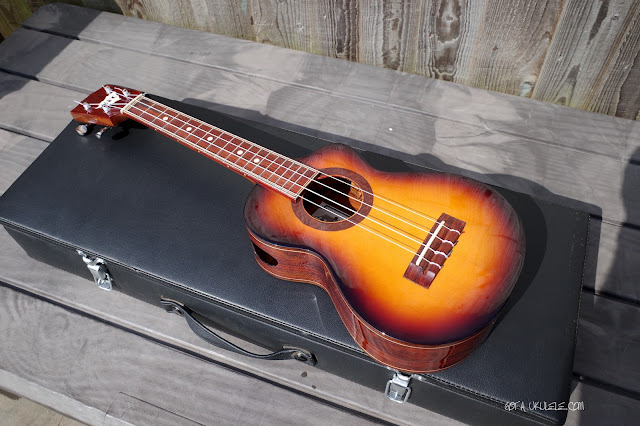
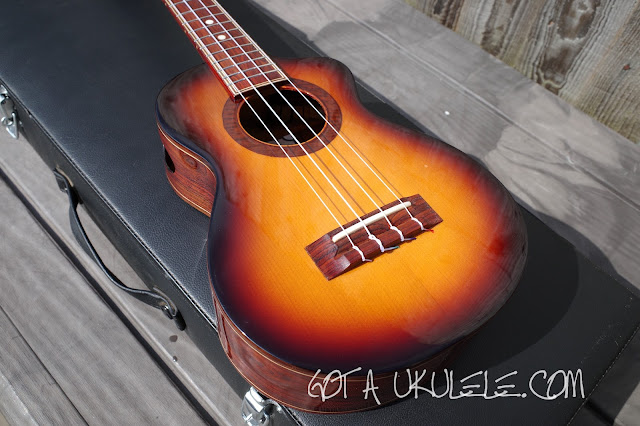



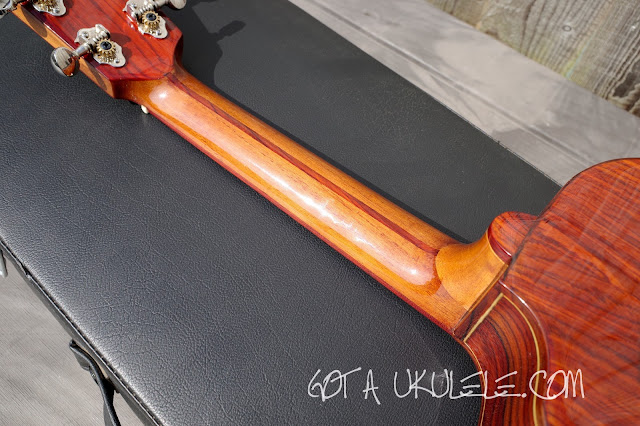
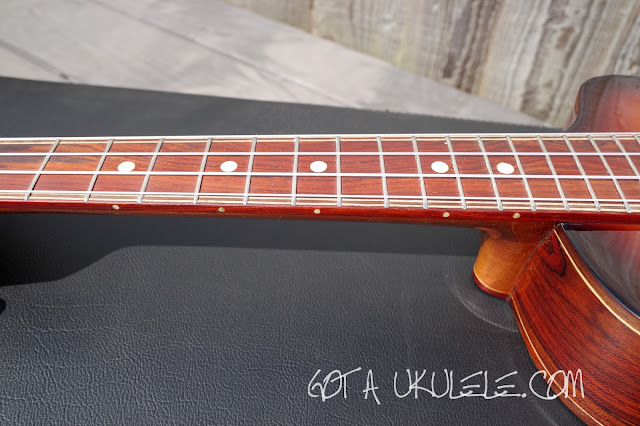
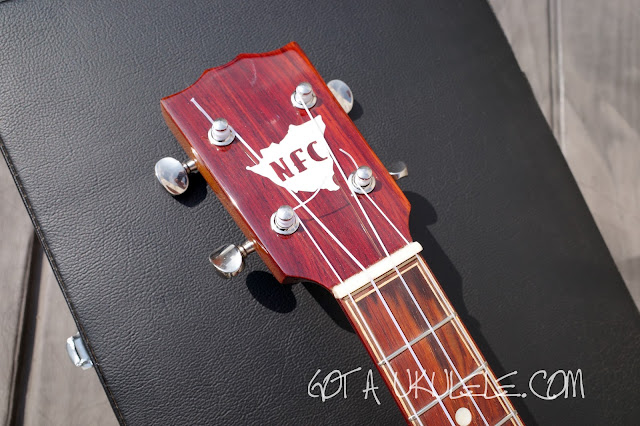


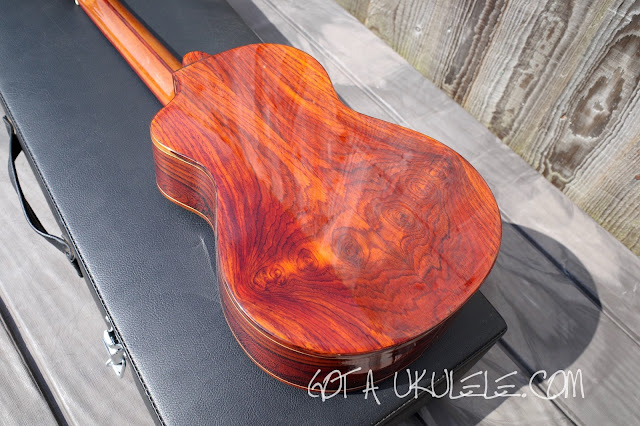

Simply an opinion here, Baz, but as well-made and visually striking as the instrument obviously is, the body of the ukulele appears to be too sturdy, as in overbuilt, rather than constructed for appropriate integrity and optimal sound. Perhaps that's why it sounds somewhat constrained, at least to my ears. The woods should be strong enough to remain intact and viable yet thin enough to vibrate and project.
ReplyDeleteThis comment has been removed by a blog administrator.
DeleteI actually think it’s the strings. The body wood is thin and seriously light
DeleteSince you've actually held and played it - and I haven't - your professional opinion means more than my long distance impression. I myself find that even highly-touted strings are not always the best sounding with regard to the various shapes, sizes and builds of instruments. Fluorocarbons happen to be my favorite.
DeleteI really do think that's the case here, or possibly the gauges. I am not a fan of Aquila and they feel a bit flabby here - I'm sure light gauge fluorocarbons would make it punch more.
DeleteIs it just me, or are the G and A strings *really* close to the edge of the fretboard? I would constantly be dragging the strings off the sides.
ReplyDeleteThink it's an optical illusion with the purfling strip - I didn't notice a problem
Delete